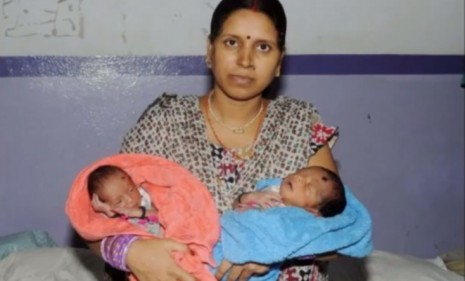The mom who bore two boys out of separate wombs
A 28-year-old woman in Patna, India, has two uteruses — an incredibly rare and risky condition

A free daily email with the biggest news stories of the day – and the best features from TheWeek.com
You are now subscribed
Your newsletter sign-up was successful
A woman in India who has an unusual condition known as "uterus didelphys" has stunned doctors by giving birth to two healthy boys — one from each of her two uteruses. Each of Rinku Devi's two boys (who aren't technically twins) was conceived in a separate womb from two different fertilized eggs and, though the largest weighed only 4.4 pounds at birth, both are reportedly doing well. Some key facts:
How common is uterus didelphys?
It's exceedingly rare. Fewer than 100 women worldwide are known to have the condition. Though Devi, 28, had given birth to another baby four years ago, she didn't even find out that she had two uteruses or that such a thing was possible until her late July delivery. "I was already in labor pain...and quite scared," says Devi, as quoted by Metro.
The Week
Escape your echo chamber. Get the facts behind the news, plus analysis from multiple perspectives.

Sign up for The Week's Free Newsletters
From our morning news briefing to a weekly Good News Newsletter, get the best of The Week delivered directly to your inbox.
From our morning news briefing to a weekly Good News Newsletter, get the best of The Week delivered directly to your inbox.
How does a woman wind up with two uteruses?
In a female fetus, the uterus begins as two small tubes that typically join together to create a single womb. Sometimes, the tubes don't join completely and develop into separate cavities.
Was Devi's pregnancy or delivery complicated?
Not in this case. Devi and her doctor believed she was carrying two babies — which they assumed were twins — and she delivered her sons by Caesarian section. "When I understood the situation, I was a little taken aback," says Dr. Dipti Singh. "I had never handled such a case before." More typically, however, uterus didelphys does carry significant dangers.
A free daily email with the biggest news stories of the day – and the best features from TheWeek.com
What are the risks?
The chances of miscarriage, premature labor, and critically underweight newborns are high. In some cases, the babies can die. As for the mothers, they may suffer pelvic pain or repeated miscarriages. "I am happy to have survived through this," says Devi.
Sources: AOL News, Metro, Mayo Clinic
-
 The ‘ravenous’ demand for Cornish minerals
The ‘ravenous’ demand for Cornish mineralsUnder the Radar Growing need for critical minerals to power tech has intensified ‘appetite’ for lithium, which could be a ‘huge boon’ for local economy
-
 Why are election experts taking Trump’s midterm threats seriously?
Why are election experts taking Trump’s midterm threats seriously?IN THE SPOTLIGHT As the president muses about polling place deployments and a centralized electoral system aimed at one-party control, lawmakers are taking this administration at its word
-
 ‘Restaurateurs have become millionaires’
‘Restaurateurs have become millionaires’Instant Opinion Opinion, comment and editorials of the day